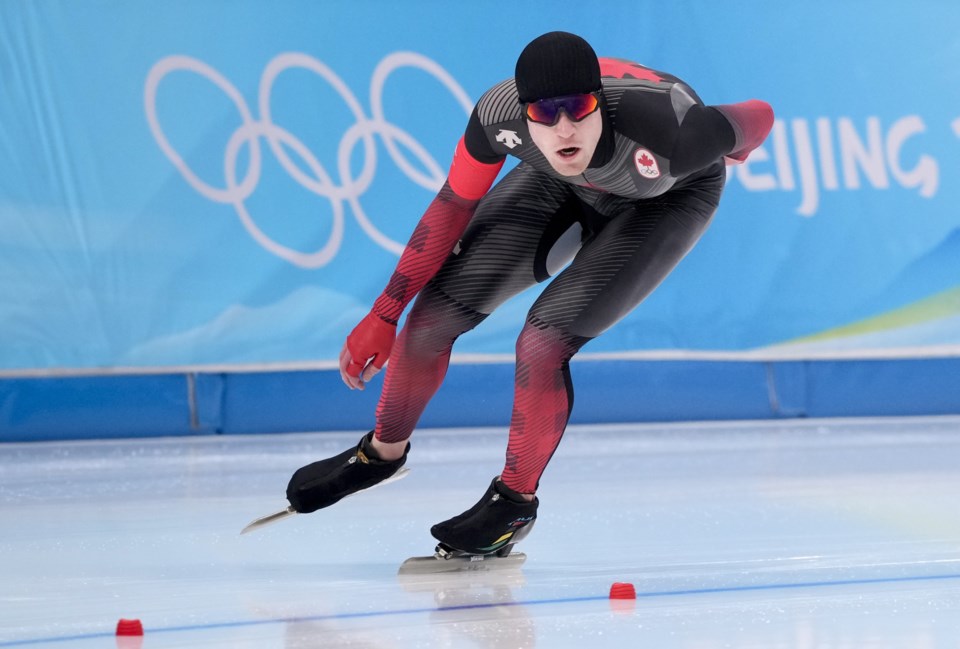BEIJING — Around the halfway point of the 10,000 metres, Ted-Jan Bloeman passed his coach Bart Schouten and made a slashing gesture with his right hand.
He was done. Canada's defending Olympic champion was still in bronze-medal position, but he'd run out of gas. A medal wasn't possible — and he knew it.Â
The 35-year-old from Calgary finished eighth in the event that made him a Canadian hero four years ago in Pyeongchang, done in by a non-COVID illness that sidelined him for the better part of a month. Knowing he didn't have enough juice in the tank, he shut it down about 12 laps into the 25-lap race.
"I tried to bring down the lap times a little bit, a couple times," Bloemen said. "But I couldn't hold them. I had to push too hard to do those lap times. So, I made the decision to save myself a little bit for the team pursuit, because it starts in two days.Â
"I don't know who made the schedule, but it's ridiculous," he added, angrily. "You can't recover in two days from digging really deep on a 10k. The countries that don't have skaters in the 10k have a huge advantage in the team pursuit."
Bloemen crossed the finish line in 13 minutes 1.39 seconds, well back of Swedish champion Nils van der Poel, who shattered his own world record in 12:30.74, and also behind Canadian teammate Graeme Fish, who was sixth in his Olympic debut (12:58.80).
"I think it's very clear right now that Ted has been sick too much," Schouten said. "We just see now that even a 5k or a 10k is just too long for him. He's just not in good enough shape, and it's cost him too much being sick this close to the Olympics, there was no time to build it back up."
Fish is also coming back from illness. The 24-year-old from Moose Jaw, Sask., contracted COVID-19 two months ago while competing in Norway. The Olympics are his first international competition since, and seconds after gliding to a stop at the National Speed Skating Oval — or "Ice Ribbon" — on Friday, he bent over the trackside pads and threw up into a bucket that was hastily fetched by an official.
"It was the best I could have done today. Two months ago, I had COVID," said Fish, who was sidelined for a month. "And yeah, it was kind of tough to kind of come back from there. (But) it was fun out there. I'm here at the Olympics, and it's a dream come true."
Bloemen skated in the final pair of the night, and was warming up near the finish line when the Swedish champ powered down the final stretch, poking his long blade across the finish line. Bloemen applauded the world-record performance, and then high-fived the Swedish star.Â
Only two years ago, it was Bloemen and Fish who were earning applause. At the 2020 world single distance championships in Salt Lake City, Fish raced to gold in the 10k, breaking the world record that Bloemen had held for five years.Â
Speaking with reporters after Friday's disappointing results, Schouten couldn't help but think: if only.
"They just didn't have enough after being sick," he said. "And that's very unfortunate, because we know two years ago they were one and two in this distance. It's very frustrating. But you kind of have to accept it’s just what happens. People get sick, especially we all know about in the last two years, right? It's been bad timing."
The global pandemic was tough on Canada's speedskating team. Schouten said they had no access to the Olympic Oval in Calgary for nine months. They trained on nearby lakes, and even on the backyard pond of a team member. Because of border restrictions, they couldn't leave the country to compete or even train.
"We were very, very handicapped," Schouten said.Â
But the skaters had bounced back well since the Oval reopened, and border restrictions loosened. Both Bloemen and Fish laid down fast times in the fall before their illnesses.
Bloemen, who tested negative for COVID-19 numerous times, believes he had a flu bug.Â
"But it cost me four weeks of training," he said. "And that was basically the whole training block that we had planned in between the World Cup season and Olympics. So, I think that's really the big cause why I just had not enough for the 5 and the 10k."
Five nights earlier, he'd faded badly to finish 10th in the 5,000, the distance he'd captured Olympic silver in four years ago in Pyeongchang.
Bloemen's medal performances at the 2018 Games were what prompted Fish to shoot for Olympic glory.
While he didn't achieve it on Friday, he skated his heart out. The vomiting was proof. He was actually pleased about that.Â
"If I don't throw up after a race, it means I didn't go all out. So I'm happy I threw up," he said with a laugh. "I like pain. I love skating. And for me, the longer the better, the longer you get to skate the better. It kind of drives me."
Fish lamented not being in the position he was in two years ago, among the world's best. He would've liked to have challenged the Swede. But he had kind words for van der Poel, calling him "unbelievable."Â
"No one's even close to him," Fish said. "He's changing how probably everyone's going to be training now. The way he skates is unbelievable. I wish I could skate as well. I can't comprehend it, he's out of this world."
Bloemen, Connor Howe and Jordan Belchos, meanwhile, will skate in the team pursuit, which begins with the quarterfinals on Sunday.Â
This report by The Canadian Press was first published Feb. 11, 2022.
Lori Ewing, The Canadian Press

